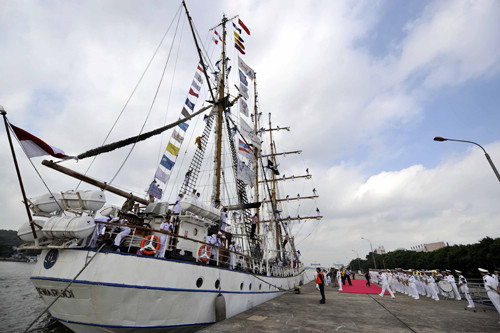|
 |
|
REGIONAL RAPPORT: KRI Dewaruci, a training vessel of the Indonesian Navy, visits a Chinese naval base in south China's Guangzhou City on July 30, 2011 (CHEN YEHUA) |

Despite tangible progress in terms of regional cooperation, problems remain in the South China Sea. Maritime boundary claims remain a point of contention and incidents of piracy are still often reported. Adding to the tension is the involvement of extra-regional states, particularly the United States, in what is essentially a matter for regional states.
The economic, political and strategic importance of the South China Sea cannot be overstated. The area around the Strait of Malacca is the major sea lane for China's trade and ships from the Chinese Navy also have to traverse the strait in order to make visits outside the region.
In terms of China's strategic interests, maintaining safety of navigation in the region to safeguard China's political independence, territorial integrity and sustainable economic and social development is of vital importance. To guarantee safety and stability, China has consistently worked with its neighbors to ensure that any disputes concerning the South China Sea can be swiftly and fairly settled.
On July 20, 2011, China and the member nations of the Association of Southeast Asian Nations (ASEAN) reached a series of important agreements in Bali, Indonesia, on implementing the 2002 Declaration on the Conduct of Parties in the South China Sea (DOC), laying a solid foundation for practical cooperation in the area. The agreements were made at a meeting of senior officials from China and ASEAN nations aimed at promoting the implementation of the DOC. Participants at the meeting agreed that implementing the terms of the DOC and enhancing practical cooperation will help maintain peace and stability in the South China Sea, promote China-ASEAN relations and serve the common interests of the parties concerned.
China has made a number of proposals for further cooperation, including the convening of a symposium on freedom of navigation in the South China Sea, and the establishment of three special committees on marine scientific research and environmental protection; navigation safety and search and rescue operations; and combating transnational crimes at sea.
To follow up on the proposals above, an international seminar focusing on the theme of "implementing DOC: maintaining freedom and safety of navigation in the South China Sea" was convened at the National Institute for South China Sea Studies in Haikou, Hainan—the southernmost province of China—in December 2011. More than 60 diplomats, scholars and experts from China, Indonesia, Cambodia, Malaysia, the Philippines, Singapore, Thailand, Brunei, Myanmar, Laos and the United States were present at the event.
Piracy has been a major threat to navigation security in the South China Sea. In the first quarter of 2010, 13 cases of piracy occurred in the sea. In terms of the overall number of incidents of piracy, the South China Sea was second only to the waters off east Africa, including Somali waters and the Gulf of Aden. Over the past two decades, pirates in the Southeast Asia have evolved from small bands of boat-based raiders to highly organized criminal gangs.
A number of Asia-Pacific nations have joined forces to combat piracy. In November 2004, the Regional Cooperation Agreement on Combating Piracy and Armed Robbery Against Ships in Asia was concluded in Tokyo by the 10 ASEAN member states, China, Japan and South Korea. The agreement entered into force in September 2006. An Information Center was established in Singapore by contracting parties in accordance with the agreement.
|
